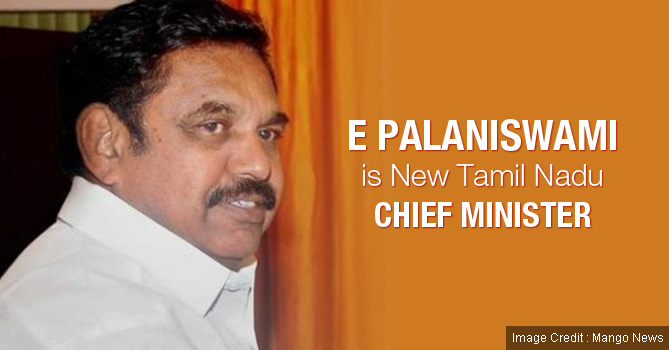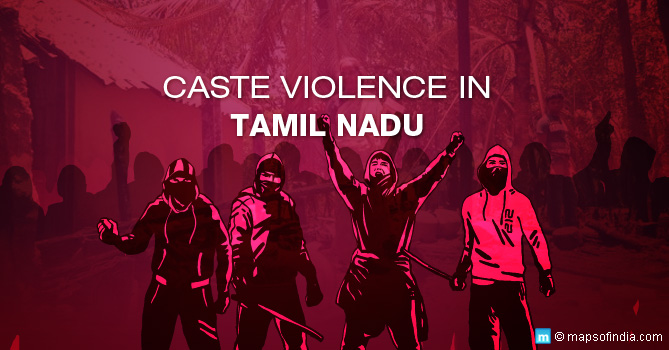The political world in Tamil Nadu started picking up shape at long last with Edappadi Palaniswami taking charge as the Tamil Nadu Chief Minister, ending the 10-day long bitter feud between AIADMK general secretary VK Sasikala and former CM, O Panneerselvam (OPS).
His appointment is in acceptance of the “letter of submitted by Palaniswami on Tuesday that he was elected as the leader of the AIADMK legislature party at a meeting of the party MLAs held on that day,” a Raj Bhavan press note said.
The 63-year-old Sasikala loyalist Palaniswami took the oath of office and secrecy along with his 30-member Cabinet at a ceremony in the Raj Bhavan which was administered by Governor C Vidyasagar. Palaniswami has retained the crucial finance portfolio with himself along with the portfolios of public works, highways and minor ports that he had held in the earlier O Panneerselvam ministry.
Palaniswami’s Cabinet comprises of four women including Valarmathi, Dr Nilofer Kafeel, Dr V Saroja and VM Rajalakshmi. While OPS and Pandiarajan naturally do not feature in the cabinet of ministers, all other members of the OPS cabinet retain their position though some of their portfolios have been changed. Sasikala’s nephew TTV Dhinakaran has not been included in the minister’s list.
The confidence vote will take place within two days of his swearing-in, in a special session of the Tamil Nadu Assembly on February 18. Speaker P Dhanapal has convened the session of the Tamil Nadu assembly at 11 am on Saturday for the trust vote, Assembly Secretary A M P Jamaludeen said in a statement.
The Governor of Tamil Nadu, C Vidyasagar, has given a time frame of 15 days to Palaniswami to prove his majority in the Assembly. Palaniswami has claimed that he has the support of 124 of the 134 AIADMK MLAs.
AIADMK Senior Leader M. Thambidurai said that the appointment of Palaniswami was a people’s victory and they would carry forward the legacy of Amma. He further added that there was no factions in the AIADMK party and OPS, who is no longer a party member, is the only one apart.
Palaniswami over Sengottaiyan and M. Thambidurai
The contenders for the office of CM of Tamil Nadu were basically ministers from the districts of the state which have had an edge over DMK and has helped propel the prospects of AIADMK in several elections. Of these districts are the western belt of Tamil Nadu (called “Kongunadu” in Tamil), and Madurai regions including Theni. The stalwart politicians of these regions are senior grassroots leaders such as K A Sengottaiyan, M. Thambidurai and O Panneerselvam who have been long-time followers of Amma.
A seven-time legislator, K A Sengottaiyan has been sidelined by the party leadership more than once but he has always remained steadfast in his loyalty to the party. With reports of his disenchantment coming in, Sasikala mollified him and made him one of the organising secretaries of the party, thus pooling in his support. When rumours were rift about him being the CM candidate, Sengottaiyan declared, “I am certainly not a CM candidate. There is absolutely no question of anyone other than Chinnamma becoming the CM. That’s unthinkable.” Sengottaiyan is a very affable human being and extremely popular among the party workers as well as the public. Maybe these are the two key features which stopped Sasikala from choosing him as the CM candidate.
As for Thambidurai, he has from the very onset of this crisis been advocating the nomination of Sasikala as the next CM. Thambidurai has been in the radar of the BJP in the past with the party trying to facilitate his anointment as CM, but the attempt was in vain. Thambidurai has exceptional loyalty towards the party to go against Sasikala, as the AIADMK has been cultivating him since 2014, and it was instrumental in his selection as deputy speaker, overlooking the Congress, which has more MPs than the AIADMK in the lower house.
The strongman of Salem district, Palaniswami, a Sasikala loyalist, is the third Tamil Nadu CM in less than three months. He was chosen as the legislature party leader on Tuesday, hours after Supreme Court upheld the Bengaluru special court verdict convicting AIADMK interim general secretary VK Sasikala in the disproportionate assets case.
A senior leader of the AIADMK said that after Jayalalithaa’s demise Sasikala had preferred Palaniswami to OPS as the next CM of Tamil Nadu, but OPS won the race with the Centre’s backing.
Palanisamy hails from a region that is known for its powerful representation of Gounder community and a stronghold of the AIADMK. He was very close to Late Jayalalithaa and was a member of the Nalvar Ani (Amma’s close coterie of the ‘Four Man Army’). It now remains to be seen if he will act as an independent person in his decisions or will have his strings pulled by Chinnamma.
Will Tamil Nadu At Last Come out of this phase of Political crises?
When the erstwhile CM of Tamil Nadu, Marudur Gopalan Ramachandran (MGR) passed away in 1987, his loyalist Jayalalithaa, though self proclaimed, was there as the political heir to take over the reins of the government with maximum support of the people of the state.
Unfortunately, Jayalalithaa did not have any clear successor, charismatic enough, who was well known or had the support of the people to take over the reins after her demise. This led to the political crisis in Tamil Nadu with a massive succession war within the ruling AIADMK.
In her 5 terms as the Chief Minister of Tamil Nadu, Jayalalithaa left no stone unturned towards the development of the state. Today, Tamil Nadu has some of the best public services among all Indian states, and many of them are accessible to all on a non-discriminatory basis.
Social programmes such as universal midday meals in primary schools, an extensive social infrastructure – schools, health centres, roads, public transport, water supply, electricity connections, and much more, were all conducted under the helm of Jayalalithaa. Apart from a reflection of the positive impact of the ruling elite, the progress in Tamil Nadu has also been an outcome of democratic politics, including organised public pressure.
Today, the absence of a clear political heir to take over the reins should not undo the good that has been done so far. Democracy in Tamil Nadu is at stake. Hopefully, with the successful completion of the confidence vote, as well as Palaniswami proving his majority in the assembly, the ripples that have been created in the sea of politics will subside and Tamil Nadu will be back on the tracks towards further progress.





